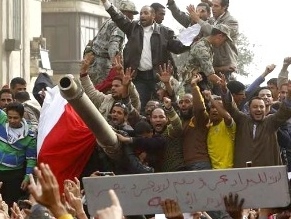|
World Jewish News

Demonstrators celebrate atop an army tank in Tahrir square during protests in Cairo January 29, 2011. Photo by: Reuters
|
Egypt army backs protesters: We won't use force against you
31.01.2011, Israel and the World An Egyptian army spokesman said that the army understands the legitimacy of the demands of the protesters in Egypt on Monday, adding that the army does not intend to use force on them.
Appearing on state TV on Monday, Ismail Etman warned against any act that destabilizes the security of the country but emphasized that the army has not and will not use force against the public.
Demonstrations and violent riots have continued in Egypt for the seventh straight day, with protesters refusing to leave the streets until Egyptian President Hosni Mubarak leaves the government.
Mubarak, for his part, has tried to quell the protesters by forcing his cabinet to resign and promising to make significant government reforms. But protesters continue to call for the end of Mubarak's reign on the country, which has lasted for over three decades.
The spokesman's comments follow widespread reports of the army showing leniency towards the protesters.
On Saturday, as protesters gathered in Cairo's central square, military officers stationed in the area reportedly embraced the protesters, chanting "the army and the people are one – hand in hand."
On Monday, the protests continued unabated, with people calling for a "million man march" on Tuesday to mark one week since the uprising.
The mood in Cairo's Tahrir Square on Monday, surrounded by army tanks and barbed wire, was celebratory and determined as more protesters filtered in to join what has turned into a continual encampment despite a curfew, moved up an hour to 3 p.m. on its fourth day in effect.
Young men climbed lampposts to hang Egyptian flags and signs proclaiming "Leave, Mubarak!" One poster featured Mubarak's face plastered with a Hitler mustache, a sign of the deep resentment toward the 82-year-old leader they blame for widespread poverty, inflation and official indifference and brutality during his 30 years in power.
Looting that erupted over the weekend across the city of around 18 million eased - but Egyptians endured another day of the virtual halt to normal life that the crisis has caused. Trains stopped running Monday, raising the possibility authorities were trying to prevent residents of the provinces from joining protests in the capital.
Banks, schools and the stock market in Cairo were closed for the second working day, making cash tight. An unprecedented complete shutdown of the Internet was in its fourth day. Long lines formed outside bakeries as people tried to replenish their stores of bread.
Cairo's international airport was a scene of chaos and confusion as thousands of foreigners sought to flee the unrest, and countries around the world scrambled to send in planes to fly their citizens out.
The official death toll from the crisis stood at 97, with thousands injured, but reports from witnesses across the country indicated the actual toll was far higher.
By Avi Issacharoff and News Agencies
Haaretz.com
|
|
